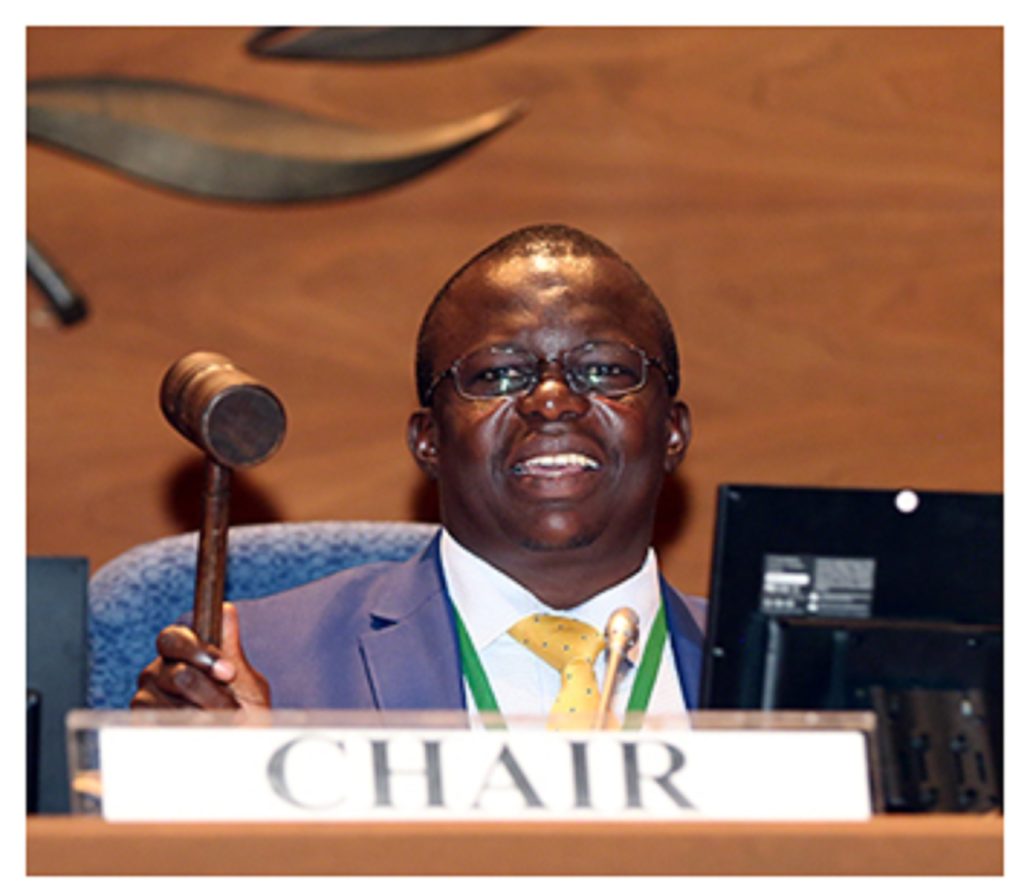
Parties to the United Nations Convention on Biological Diversity (UNCBD) held a meeting of the Subsidiary Body on Implementation (SBI) of CBD and its Protocols (the Cartagena Protocol on Biosafety and the Nagoya Protocol on Access to Genetic Resources and Benefit Sharing from 7 – 13 July 2018 in Montreal, Canada.
Uganda is a party to the Convention and its Protocols. The meeting was held to develop and agree on recommendations for consideration and approval by the Conference of the Parties (COP) to the CBD. COP14 will take place in Sharm El-Sheikh, Egypt from 17-29 November 2018. COP and COPMOP are the decision making bodies of UNCBD and its Protocols. COP14
During COP14 it was agreed that the regional groups provides the Chairs of SBI in the following order: (i) Africa; (ii) Western Europe and others; (iii) Asia and the Pacific; (iv) Latin America and the Caribbean; and (v) Central and Eastern Europe. Candidates for the Chair of SBI are required to have experience in the processes of the CBD and competence in matters related to the Convention and its Protocols.
Mr. Francis Ogwal, who is a Natural Resources Manager (Biodiversity and Rangelands) at the National Environment Management Authority (NEMA) as well as the National Focal Point for the UNCBD for Uganda was elected by the Africa region as the First Chair of SBI.
He became the first Chair of SBI globally and also the first African to hold that post. Accordingly Mr. Francis Ogwal chaired SBI-2 meeting and the team resolved that Gender should be integrated into biodiversity issues and in this regard, Parties agreed to expedite implementation of the 2015-2020 Gender Plan of Action for the CBD.
“Uganda has included gender into its revised national biodiversity strategy and action plan (NBSAP). Parties to the Nagoya Protocol on Access to Genetic Resources and Benefit Sharing (ABS) to establish institutional structures and legislative, administrative or policy measures on access and benefit-sharing. Furthermore COP14 will invite the Global Environment Facility (GEF) to support the implementation of the Nagoya Protocol. The GEF has approved support to Uganda for implementation of the Protocol.”
They also added that the biodiversity should be mainstreamed in the energy and mining, infrastructure, manufacturing and processing and health sectors, recognizing that on the one hand, these sectors depend, to varying degrees, on biodiversity and the ecosystem services that biodiversity underpins and that the consequent loss of biodiversity can impact these sectors negatively, and that, on the other hand, these sectors have potential impacts on biodiversity which may threaten the provision of ecosystem functions and services that are vital to humanity.
“Mainstreaming biodiversity into these is essential for halting the loss of biodiversity. Uganda has put in laws, regulations and institutional framework on environmental impact assessment and this will enhance mainstreaming of biodiversity in these sectors. Furthermore capacity of technical officers from Government Ministries, Departments and Agencies is being built on the application of mitigation hierarchy for biodiversity offsets namely avoidance, minimizing, restoring and offsetting to address impacts especially of mining and infrastructure development projects to ensure no net loss and where possible a net gain.” They added.
Under the Nagoya Protocol on ABS it was also agreed that the global multi-lateral benefit sharing mechanisms for sharing of benefits derived from utilization of genetic resources and traditional knowledge associated with the genetic resources that occur in trans-boundary situations or for which it is not possible to grant or obtain Prior Informed Consent (PIC) should operationalized. Uganda will be actively involved on the negotiations on this issue at COP14.
Enhance synergies among biodiversity-related conventions and other conventions at the national level for example United Nations Framework Convention on Climate Change (UNFCCC); United Nations Conventions to Combat Desertification (UNCBD), Ramsar Convention, Convention on Migratory Species (CMS); Convention on International Trade in Endangered Species of wild flora and fauna (CITES) among others. Uganda is currently implementing a GEF support project on strengthening institutional capacity for implementation of the Rio Conventions in Uganda.
Parties to the CBD that have finalized the revision and updating of their national biodiversity strategies and action plans (NBSAP) are invited to identify their funding needs, gaps, and priorities, on the basis, as appropriate, develop and implement their national finance plans for the effective implementation of their NBSAP. Uganda has developed its National Biodiversity Finance Plan to facilitate implementation of the revised NBSAP. The Plan has a number of financing solutions to address the funding gap for biodiversity conservation in Uganda estimated to be approximately USD 450 million per year. The Plan was developed with support from EU, Government of Germany, Switzerland, Norway and Flanders under the Biodiversity Finance Initiative of the United Nations Development Programme (UNDP).
Lastly the meeting agreed the processes for development of the post 2020 global biodiversity framework to replace the current Strategic Plan for Biodiversity 2011 – 2020 which Uganda has domesticated in its NBSAP. Uganda will participate in the global discussions on the post 2020 global framework for biodiversity framework and will take action to domesticate the post 2020 global biodiversity framework expected to be adopted in 2020 during the COP15 in Beijing, China.
